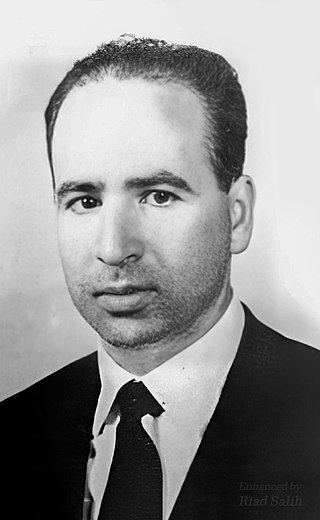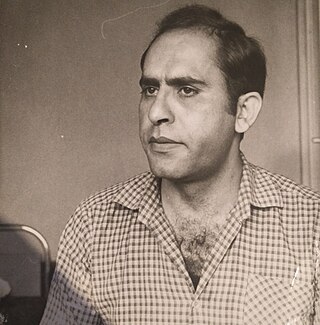
Algiers is the capital and largest city of Algeria. The city's population at the 2008 census was 2,988,145 and in 2020 was estimated to be around 4,500,000. Algiers is in the north-central part of Algeria.

SuperStar was an Arabic television show based on the popular British show Pop Idol created by Simon Fuller's 19 Entertainment & developed by Fremantle Media. The show unites the Arab community by democratically choosing the next singing sensation. The show is broadcast worldwide on Future TV, a Lebanese television station. It is also the first Idol franchise to feature contestants from multiple countries.
Hassan Khaled was the leader of Lebanon's Sunni Muslim community. As a grand mufti, he presided over Islamic courts in Lebanon for 23 years, and served as Head of the Islamic Coalition, a body which included past and present prime ministers, Sunni parliamentary figures, and Sunni members of Lebanon's government. He was considered a moderate, and upon his assassination was named as the "father of moderation," as he worked throughout his career to bring unity to the warring factions of the Lebanese Civil War. Khaled's assassination in 1989 was widely believed to be the work of Syria.

Ahlam Mosteghanemi is an Algerian poet and writer. She was the first Algerian woman to write poetry and fiction in Arabic, and best known for her 1993 novel Memory of the Flesh.

Mohammed Arkoun was an Algerian scholar and thinker. He was considered to have been one of the most influential secular scholars in Islamic studies contributing to contemporary intellectual Islamic reform. In a career of more than 30 years, he had been a critic of the tensions embedded in his field of study, advocating Islamic modernism, secularism, and humanism. During his academic career, he wrote his numerous books mostly in French, and occasionally in English and Arabic.

Krim Belkacem was the historic leader of the National Liberation Front during the Algerian War. As vice-president of the GPRA, he was the sole signatory of the Évian Accords on the Algerian side. After the 1965 coup d'état, he went into exile and was assassinated in Germany in 1970.

The University of Algiers, commonly called the Algiers 1 University or Benyoucef Benkhedda, is a public research university based in Algiers, Algeria. Founded in 1909 from the amalgamation of different institutions, it has become the oldest and most prestigious organised university in the country.

Mouloud Mammeri was an Algerian writer, anthropologist and linguist.

Algiers Province is a province (wilayah) in Algeria, named after its capital, Algiers, which is also the national capital. It is adopted from the old French department of Algiers and has a population of about 8 million. It is the most densely populated province of Algeria, and also the smallest by area.

Benyoucef Benkhedda was an Algerian politician. He headed the third GPRA exile government of the National Liberation Front (FLN), acting as a leader during the Algerian War (1954–62). At the end of the war, he was briefly the de jure leader of the country, however he was quickly sidelined by more conservative figures.
Bab Ezzouar is a suburb of the city of Algiers in northern Algeria. It is one of Algiers fastest growing municipalities and has seen many hotels and commercial malls being raised in the area. Bab Ezzouar is also the location of the University of Science and Technology of Houari Boumediene (USTHB), which is one of the most prominent technological universities in Algeria.
Fawwaz Tuqan is a Jordanian-Palestinian poet, novelist and professor. He was born on 6 September 1940 to a Palestinian family in Jerusalem. His father is Ahmad Abdul Fattah Tuqan, a former Prime Minister of Jordan.
Saddek Rabah is an Algerian researcher, professor and author in the field of information science and communication. He has been teaching higher education since the year 2000.

Abdelhamid ben Hadouga or Abdelhamid Benhedouga was an Algerian writer, born on 9 January 1925 in Mansourah near Bordj Bou Arréridj to an Arab Algerian father and a Berber mother. He wrote more than fifteen novels in Arabic as well as short stories and plays. He has been described as one of the most important Algerian writers in Arabic of his time. He also worked for cultural programming in a number of radio stations in Paris, Tunisia and Algeria. Between 1957 and 1974, he wrote tens of theatrical pieces and sketches for the BBC Arabic Service, Tunisian radio and TéléDiffusion d'Algérie. His novel Vent du Sud was adapted to a feature film. many of his books were translated to French. Ben Hadouga died on 26 October 1996.

Charbel Dagher is a Lebanese professor at the University of Balamand, Koura, Lebanon. He has been an active and prominent voice on the Arab cultural scene, mainly in the fields of poetry, Arabic language, and Arab and Islamic arts. He is a Poet, writer and story-writer in both Arabic and French.

His Excellency Dr Albert Jamil Butros was a Jordanian Ambassador and emerited Dean (education) of the University of Jordan.
The 2019–20 Arab Club Champions Cup knockout stage began on 20 August 2019 and ended on 21 August 2021 with the final at the Prince Moulay Abdellah Stadium in Rabat, Morocco, to decide the champions of the 2019–20 Arab Club Champions Cup. A total of 32 teams competed in the knockout stage.

Izz Al-Din Manasirah was a Palestinian poet, critic, intellectual and academic born in the town of Bani Naim, Hebron Governorate, Palestine. Winner of several prizes as a cadet and an academic, he was a poet of the Palestinian resistance from the late 1960s on, and his name was associated with armed and cultural resistance. He was with such poets as Mahmoud Darwish, Samih al-Qasim and Tawfiq Ziad, or as they are collectively called, the "Big Four in Palestinian Poetry." He sang poems by Marcel Khalife and others and was famous for his poems "Jafra" and "The Green Kannah."

















